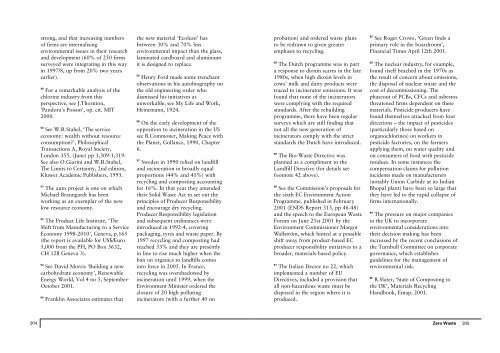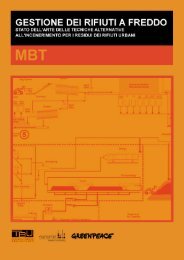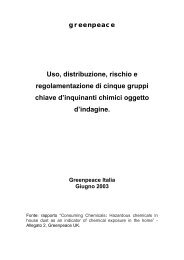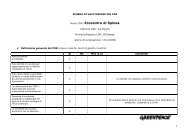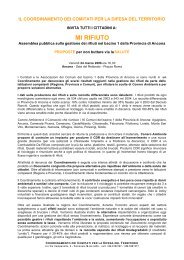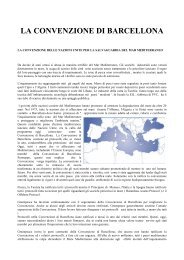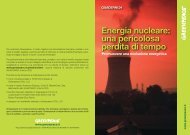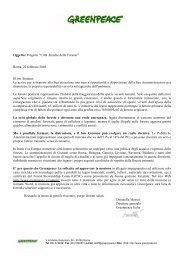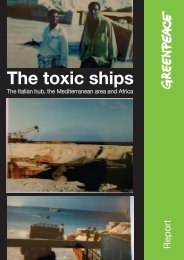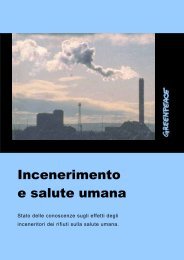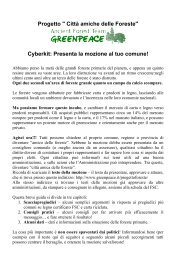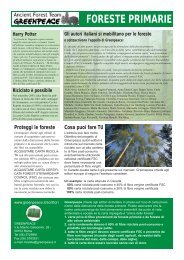Zero Waste by Robin Murray, Greenpeace Environmental Trust 2002
Zero Waste by Robin Murray, Greenpeace Environmental Trust 2002
Zero Waste by Robin Murray, Greenpeace Environmental Trust 2002
You also want an ePaper? Increase the reach of your titles
YUMPU automatically turns print PDFs into web optimized ePapers that Google loves.
strong, and that increasing numbers<br />
of firms are internalising<br />
environmental issues in their research<br />
and development (60% of 250 firms<br />
surveyed were integrating in this way<br />
in 1997/8, up from 20% two years<br />
earlier).<br />
49<br />
For a remarkable analysis of the<br />
chlorine industry from this<br />
perspective, see J.Thornton,<br />
‘Pandora’s Poison’, op. cit. MIT<br />
2000.<br />
50<br />
See W.R.Stahel, ‘The service<br />
economy: wealth without resource<br />
consumption?’, Philosophical<br />
Transactions A, Royal Society,<br />
London 355, (June) pp 1,309-1,319.<br />
See also O.Giarini and W.R.Stahel,<br />
The Limits to Certainty, 2nd edition,<br />
Kluwer Academic Publishers, 1993.<br />
51<br />
The auto project is one on which<br />
Michael Braungardt has been<br />
working as an exemplar of the new<br />
low resource economy.<br />
52<br />
The Product Life Institute, ‘The<br />
Shift from Manufacturing to a Service<br />
Economy 1998-2010’, Geneva, p.165<br />
(the report is available for US$/Euro<br />
5,000 from the PFI, PO Box 3632,<br />
CH 12ll Geneva 3).<br />
53<br />
See David Morris ‘Building a new<br />
carbohydrate economy’, Renewable<br />
Energy World, Vol 4 no 5, September-<br />
October 2001.<br />
54<br />
Franklin Associates estimates that<br />
the new material ‘Ecolean’ has<br />
between 30% and 70% less<br />
environmental impact than the glass,<br />
laminated cardboard and aluminium<br />
it is designed to replace.<br />
55<br />
Henry Ford made some trenchant<br />
observations in his autobiography on<br />
the old engineering order who<br />
dismissed his initiatives as<br />
unworkable, see My Life and Work,<br />
Heinemann, 1924.<br />
56<br />
On the early development of the<br />
opposition to incineration in the US<br />
see B.Commoner, Making Peace with<br />
the Planet, Gollancz, 1990, Chapter<br />
6.<br />
57<br />
Sweden in 1990 relied on landfill<br />
and incineration in broadly equal<br />
proportions (44% and 41%) with<br />
recycling and composting accounting<br />
for 16%. In that year they amended<br />
their Solid <strong>Waste</strong> Act to set out the<br />
principles of Producer Responsibility<br />
and encourage dry recycling.<br />
Producer Responsibility legislation<br />
and subsequent ordinances were<br />
introduced in 1992-4, covering<br />
packaging, tyres and waste paper. By<br />
1997 recycling and composting had<br />
reached 33% and they are presently<br />
in line to rise much higher when the<br />
ban on organics to landfills comes<br />
into force in 2005. In France,<br />
recycling was overshadowed <strong>by</strong><br />
incineration until 1999, when the<br />
Environment Minister ordered the<br />
closure of 20 high polluting<br />
incinerators (with a further 40 on<br />
probation) and ordered waste plans<br />
to be redrawn to given greater<br />
emphasis to recycling.<br />
58<br />
The Dutch programme was in part<br />
a response to dioxin scares in the late<br />
1980s, when high dioxin levels in<br />
cows’ milk and dairy products were<br />
traced to incinerator emissions. It was<br />
found that none of the incinerators<br />
were complying with the required<br />
standards. After the rebuilding<br />
programme, there have been regular<br />
surveys which are still finding that<br />
not all the new generation of<br />
incinerators comply with the strict<br />
standards the Dutch have introduced.<br />
59<br />
The Bio-<strong>Waste</strong> Directive was<br />
planned as a compliment to the<br />
Landfill Directive (for details see<br />
footnote 42 above).<br />
60<br />
See the Commission’s proposals for<br />
the sixth EC Environment Action<br />
Programme, published in February<br />
2001 (ENDS Report 313, pp 46-48)<br />
and the speech to the European <strong>Waste</strong><br />
Forum on June 21st 2001 <strong>by</strong> the<br />
Environment Commissioner Margot<br />
Wallström, which hinted at a possible<br />
shift away from product-based EC<br />
producer responsibility initiatives to a<br />
broader, materials-based policy.<br />
61<br />
The Italian Decree no 22, which<br />
implemented a number of EU<br />
Directives, included a provision that<br />
all non-hazardous waste must be<br />
disposed in the region where it is<br />
produced.<br />
62<br />
See Roger Crowe, ‘Green finds a<br />
primary role in the boardroom’,<br />
Financial Times April 12th 2001.<br />
63<br />
The nuclear industry, for example,<br />
found itself beached in the 1970s as<br />
the result of concern about emissions,<br />
the disposal of nuclear waste and the<br />
cost of decommissioning. The<br />
phaseout of PCBs, CFCs and asbestos<br />
threatened firms dependent on these<br />
materials. Pesticide producers have<br />
found themselves attacked from four<br />
directions – the impact of pesticides<br />
(particularly those based on<br />
organochlorines) on workers in<br />
pesticide factories, on the farmers<br />
applying them, on water quality and<br />
on consumers of food with pesticide<br />
residues. In some instances the<br />
compensation claims for pollution<br />
incidents made on manufacturers<br />
(notably Union Carbide at its Indian<br />
Bhopal plant) have been so large that<br />
they have led to the rapid collapse of<br />
firms internationally.<br />
64<br />
The pressure on major companies<br />
in the UK to incorporate<br />
environmental considerations into<br />
their decision making has been<br />
increased <strong>by</strong> the recent conclusions of<br />
the Turnbull Committee on corporate<br />
governance, which establishes<br />
guidelines for the management of<br />
environmental risk.<br />
65<br />
R.Slater, ‘State of Composting in<br />
the UK’, Materials Recycling<br />
Handbook, Emap, 2001.<br />
204<br />
<strong>Zero</strong> <strong>Waste</strong><br />
205


